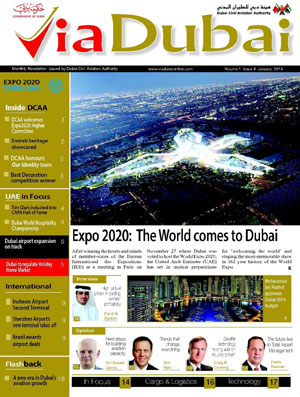
Dubai aviation sector on solid growth curve
Dubai, January 20, 2014
Aviation sector in Dubai on a solid growth curve with major airport expansion projects including the work at Dubai International Airport Terminal 1 and Concourse D progressing swiftly, said a report in the 'Via Dubai,' the official bi-lingual newsletter of Dubai Civil Aviation Authority (DCAA).
“These expansion projects at Dubai International Airport will increase the throughput of the world’s second biggest airport for international passengers to more than 90 million passengers per year by 2015," stated Sheikh Ahmed bin Saeed Al Maktoum, the president of DCAA and chairman of Dubai Airports, in his message published in the January edition of DCAA newsletter.
"This will help to meet the needs of Dubai’s ever growing aviation sector needs and to further enhance the credibility won over the years," he added.
Sheikh Ahmed said the opening of the passenger terminal at Al Maktoum International Airport at Dubai World Central (DWC) with a total capacity of more than 7 million passengers annually will provide the airlines and passengers with an extra option and pave the way for the airport to be the world travel gate in the coming years.
All indications show that the number of international passengers through Dubai Airport will be more than 65 million passengers in 2013, the glossy newsletter said.
This will inch the airport closer to its goal of becoming the world’s biggest airport in terms of international passengers, it added.
Sheikh Ahmed asserted that these achievements and practical steps taken will help support Dubai’s aviation sector capabilities and synchronize it with the wider UAE development plans which will be implemented from now on until Expo 2020, which is expected to pump billions of dollars into development projects and augment passenger numbers of Dubai’s two international airports.
In his column, Mohammed Abdulla Ahli, the director general of DCAA, said: “The aviation industry has undergone profound changes with its economic impact gaining solid grounds, especially in Dubai where its GDP contribution is expected to go up to 32 per cent in 2020.”
Stating that the international aviation was regulated by a complex web of over 3000 interlocking bilateral air services agreements, he said: “ We have more than 159 Open Skies agreements and Memorandum of Understandings (MoUs) dealing with air services liberlisation. These bilateral arrangements have contributed immensely towards the development of air transport industry in Dubai and we strongly believe that we have more milestones to cross in our long journey.”
The newsletter’s cover story titled "Expo 2020: The World comes to Dubai" suggested that Dubai, in the run up to first-ever expo in the Mena and South Asia region in 163-year history of World Expos, is projected to spend $9 billion in infrastructure upgrades, including airports expansion. Dubai Expo will attract 25 million visitors over a six month period spread over 2020 and 2021.
In an exclusive interview, a senior Emirates National Oil Company (Enoc) official said high jet fuel prices were impacting the profitability of airlines. The annual fuel bill of airlines is estimated to be over $200 billion – roughly 30 per cent of the operating costs.
The Middle East and Africa region accounts for seven per cent of the jet fuel market.
Enoc is readying a $142 million bulk liquid petroleum terminal and a jet fuel pipeline that links the terminal directly to Dubai International Airport, the official added.
In the Opinion columns, Craig Cooning, the chairman and CEO of Boeing Space and Intelligence Systems, offers insights into how satellite technology is helping the growth of aviation industry, while Frank Brenner, the director general of Eurocontrol, argues about the benefits of Total Airport Management (TAM).
Sir Howard Davies, the chairman of UK’s Airports Commission, suggests the next few steps for building the aviation capacity and Tom Klein, the CEO & president of Sabre, talks about the technology trends in the travel industry.
In the newsletter, the concept of Paperless Cockpit has been explained in details in the 'In Focus' section. Thespecial report talks about how airlines are allowing pilots to carry iPads and Electronic Flights Bags (eFB) into cockpits, thereby eliminating the need for carrying mounds of paper containing aircraft’ operating manuals, safety checklists and log books.
Several important developments in the UAE, Cargo and Logistics and Technology have also been covered in the newsletter.
The 'Flashback' section details an important milestone in Dubai’s aviation history – the inauguration of Sheikh Rashid Terminal in April 2000 and Dubai International Airport’s inspiring journey of excellence in the new millennium.-TradeArabia News Service







